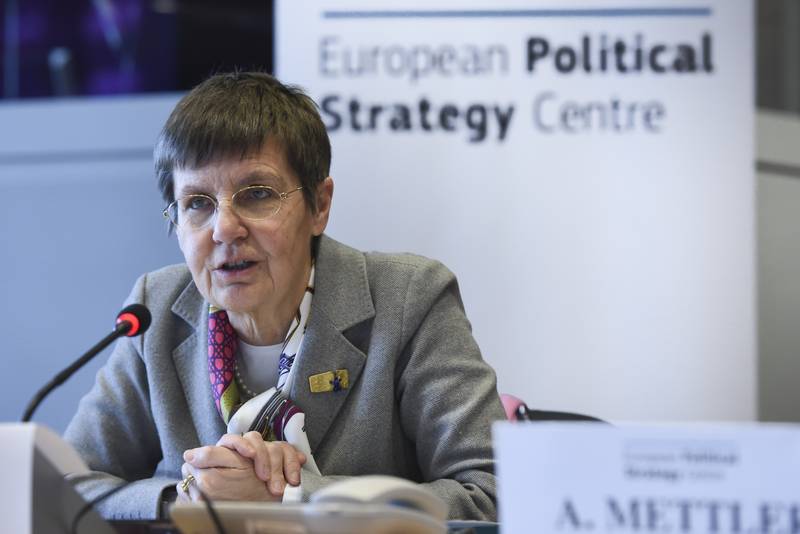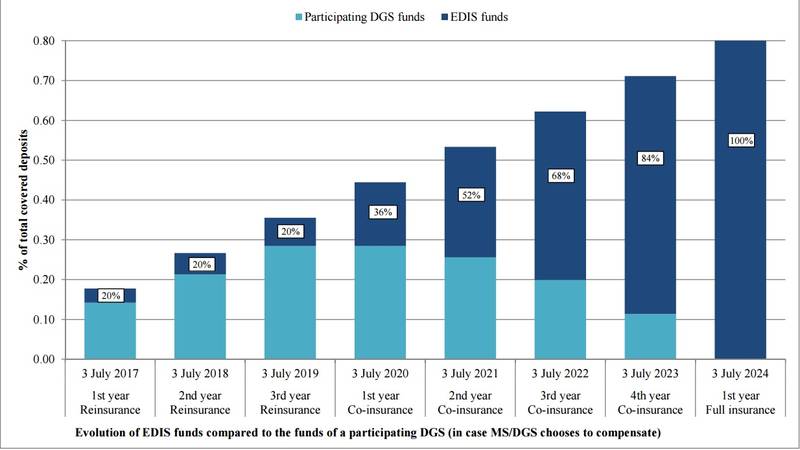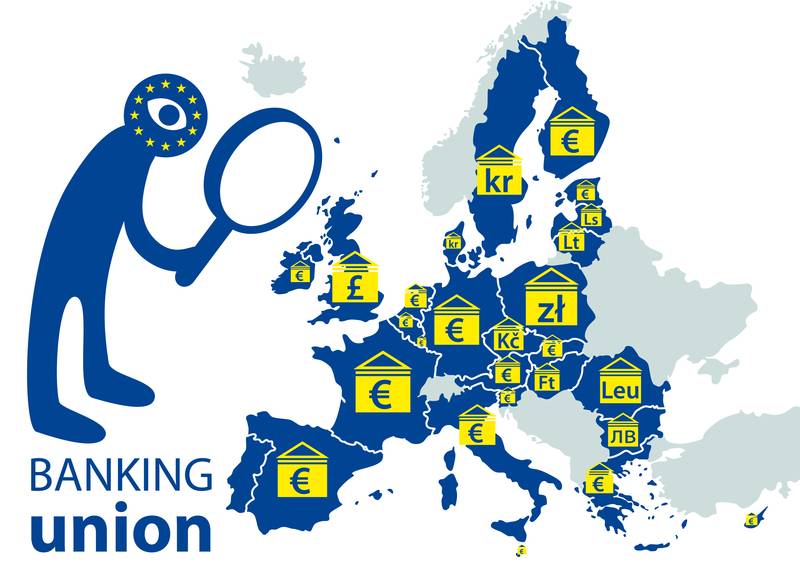More Clarity Than Desire for the Banking Union
Adelina Marini, October 1, 2012
 Spain at the moment is in a Hamlet situation, asking itself the question "To ask for a bailout or not to ask?". The government in Madrid made on Thursday, September 27th, another attempt to avoid a humiliating for the country and devastating as a strong earthquake for the eurozone, rescue loan, although all conditions are at hand for it: the European Stabilisation Mechanism (the successor of the temporary euro area rescue fund EFSF) is already in force after, as also on Thursday Germany presented the ratification documents for the treaty; the markets started again to be restive after a brief lull which even created the feeling that the crisis is starting to gradually abate as a result of the announced brave proposals for deepening of integration, some of which even pronouncing the taboo-word 'federation'; some regions of Spain are facing a default, which will force the central government to bail them out; and last but not least, the European Central Bank put as a precondition to start another portion of bond buying for Spain the country to ask for a bailout.
Spain at the moment is in a Hamlet situation, asking itself the question "To ask for a bailout or not to ask?". The government in Madrid made on Thursday, September 27th, another attempt to avoid a humiliating for the country and devastating as a strong earthquake for the eurozone, rescue loan, although all conditions are at hand for it: the European Stabilisation Mechanism (the successor of the temporary euro area rescue fund EFSF) is already in force after, as also on Thursday Germany presented the ratification documents for the treaty; the markets started again to be restive after a brief lull which even created the feeling that the crisis is starting to gradually abate as a result of the announced brave proposals for deepening of integration, some of which even pronouncing the taboo-word 'federation'; some regions of Spain are facing a default, which will force the central government to bail them out; and last but not least, the European Central Bank put as a precondition to start another portion of bond buying for Spain the country to ask for a bailout.
Mariano Rajoy's government announced another, fifth, round of measures to reduce budget spending and tax increases among a series of growing protests across the country, which is another year in a row holding the record of highest unemployment - around 25% - the highest rate in the EU, together with the highest youth unemployment rate of 50%. The new programme includes, apart from the measures for reducing spending, but also the introduction of 43 new legislative proposals for reforms. The main measures envisage cutting by 12% of average ministerial spending; freezing wages in the public sector for a third year in a row; creating a new independent institution that would monitor closely the government's finances; increasing pensions, financed by drawing of 3 bn euros from reserves; introducing a lottery tax of 20% over wins above 2,500 euros.
Spain's government insisted last week that it will keep its commitment the budget deficit not to exceed 6.3% of GDP. Besides, 2013 will be another year of recession, according to the authorities in Madrid. The package of measures is another attempt of the country to avoid asking a rescue loan from the EU, which will impose austerity measures from the outside, as happened to Greece, Portugal and Ireland.
Some good news are the results from the three-month long stress tests of the Spanish banks, which showed much lower needs for recapitalisation than estimated by Spain's partners in the euro area, who approved in the end of June a package of 100 bn euros. The needs of the country's banks are now estimated to be a little over half that money - 59.3 bn euros. Another good news is that half of the stress-tested banks proved healthy, especially the three biggest banks. Will all this calm the markets is a question very much speculated with but the history of the eurozone debt crisis shows so far that the exit is foretold. With all countries with adjustment programmes, the mechanism worked in one and the same way - denial, denial, spending cuts measures, denial and in the end filling the papers in.
10 days ago, in coffee roasting boutique Domani in Sofia, we discussed with Dimitar Ashikov, a renown Bulgarian economist, the situation in Spain. He said then that Spain was in a position of waiting. His opinion is that Spanish politicians know very well what reforms are needed but they are politically inconvenient. He quoted the famous phrase of Eurogroup chief Jean-Claude Juncker, who said some years ago that politicians knew very well what to do but did not know how to be reelected afterwards. According to Mr Ashikov, Spain has to ask for a bailout, as well as for the same time extension as currently discussed for Greece. The new prime minister of Greece, Antonis Samaras, undertook a campaign in the big European capitals earlier this year, asking for two years additional extension for the implementation of the country's adjustment programme. The decision is expected to be taken on October 8th, if by then the Troika report is ready. As euinside forecast then, most probably Greece will be granted an extension which already has a price - according to Greece it is 15 bn euros.
But the economist believes, however, that because Spain is much bigger and a  much more inert system, it must be given more time because brining the balance back needs time. Moreover, the country has a very specific problem - it is a kind of a small scale of the euro area where tensions because of the big divergences between the provinces have started to rise. The Spaniards, he said, are in a very delicate situation not only to keep the general balance in Spain but also the regional balances, especially against the backdrop of renewed calls for secession of the most industrially developed province of Catalonia, which however has significant financial needs as well. According to Dimitar Ashikov, if Spain received an extension, it should not be for the sake of pressure for reforms because, as he explained, politics in Southern Europe showed in the last few years that in order to implement certain reforms and to restructure most of all the budget sector, strong external pressure is needed as on behalf of the markets, in terms of debt servicing, but also political pressure from Northern Europe.
much more inert system, it must be given more time because brining the balance back needs time. Moreover, the country has a very specific problem - it is a kind of a small scale of the euro area where tensions because of the big divergences between the provinces have started to rise. The Spaniards, he said, are in a very delicate situation not only to keep the general balance in Spain but also the regional balances, especially against the backdrop of renewed calls for secession of the most industrially developed province of Catalonia, which however has significant financial needs as well. According to Dimitar Ashikov, if Spain received an extension, it should not be for the sake of pressure for reforms because, as he explained, politics in Southern Europe showed in the last few years that in order to implement certain reforms and to restructure most of all the budget sector, strong external pressure is needed as on behalf of the markets, in terms of debt servicing, but also political pressure from Northern Europe.
The Banking Union
The problems with the banks in Spain forced the EU leaders to search for a solution in creating a banking union. The Commission ideas were expected impatiently after the sketches of a such proposal were presented for the first time in the end of June. The specific architecture of the union was announced on September 12th, on the day when President Jose Manuel Barroso surprised with his ideas for creation of a federation of national states, supported by a proposal for amendments to the regulation for the European political parties, aimed at creating more opportunities for development of common European politics.
This web site wrote in details about the main elements of the banking union but the analysts are divided in their opinion whether it could complete its mission. Dimitar Ashikov, the economist, is of the opinion that the undertaken direction is good and is the right one. According to him, however, when quite vaguely were proposed the ideas of a banking union for the first time, there was a strong desire for it, while now, when it already has a concrete shape and filling, there is no desire. According to Ashikov, what the proposal provides is a long-term vision. He believes that it is possible by the end of the year the bargaining over it to end, which sounds pretty ambitious against the backdrop of the first frontal clash the proposal sustained in the informal Ecofin meeting in Nicosia in September, as well as given the joint position of three eurozone countries - Finland, Germany and the Netherlands.
In their statement, the three countries point out that the new framework for a single supervisory mechanism with the participation of the European Central bank had to ensure that the bank will continue to conduct effectively and independently its policies. For the purpose, a clear division is needed between the responsibilities of the new supervisory body of the ECB and the Governing Council of the bank. The mechanism should also take into account the concerns of the non-euro countries, among which most vocal is Poland. In an article for the Polish daily Gazeta Wyborcza, the Polish Secretary of State at the foreign ministry, Piotr Sarafin, writes that any reforms must ensure entry for future members, accompanied with keeping the EU integrity. According to Dimitar Ashikov, the ECB is the only reliable body that can handle the task of such a supervision. He believes, though, that there is a kind of a conflict of interest because the bank will be tasked to supervise banks it refinances.
Dessislava Nikolova, with the Institute for Market Economy, a liberal economy think-tank in Bulgaria, is of the opinion [in Bulgarian] that the new supervisory functions of the ECB will duplicate to a large extent what national supervisory bodies do at the moment. Such a duplication, she believes, will increase paperwork and will additionally burden the supervisory bodies with communication with the ECB. Besides, imposing the ECB with new functions will be practically a recognition of the failure of the European Banking Authority, which was created two years ago precisely with the task to ensure that the banking crisis of 2008 will be avoided. Dessislava Nikolova warns that the new functions of the ECB could get into conflict with its main mandate to conduct monetary policy in the eurozone.
In spite the assurances of the Commission that a "Chinese wall" will be created between the two departments of the ECB - the supervisory and that responsible for the monetary policy - there is a risk, fuelled by the ECB practise to pour liquidity for which (a practise for which there are no guarantees it will stop any time soon), the analyst with IME believes.
 Klaus Regling | © Council of the EU
Klaus Regling | © Council of the EU Mario Centeno | © Council of the EU
Mario Centeno | © Council of the EU Mario Centeno | © Council of the EU
Mario Centeno | © Council of the EU Elke Koenig | © European Commission
Elke Koenig | © European Commission | © European Commission
| © European Commission | © European Parliament
| © European Parliament